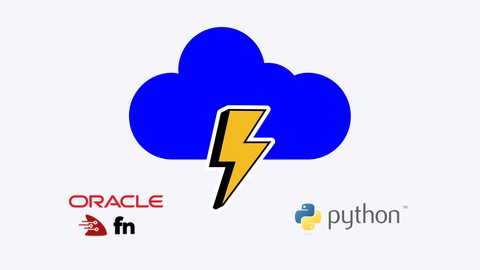
Oracle Cloud Functions (Python) – Hands-On Learning, OCI
Oracle Cloud Functions (Python) – Hands-On Learning, OCI, available at $19.99, has an average rating of 3.67, with 36 lectures, based on 6 reviews, and has 73 subscribers.
You will learn about Create Oracle Cloud (OCI) Functions with Python programming language Deploy Oracle Cloud (OCI) Functions Invoke Oracle Cloud (OCI) Functions OCI Functions develop with local development Linux machine OCI Functions develop with Oracle Cloud Shell OCI Functions develop with Oracle Cloud Code Editor / VS Code This course is ideal for individuals who are Beginners Oracle Cloud developers curious to learn OCI Functions or Beginners Oracle Cloud developers curious to learn with hands on practically It is particularly useful for Beginners Oracle Cloud developers curious to learn OCI Functions or Beginners Oracle Cloud developers curious to learn with hands on practically.
Enroll now: Oracle Cloud Functions (Python) – Hands-On Learning, OCI
Summary
Title: Oracle Cloud Functions (Python) – Hands-On Learning, OCI
Price: $19.99
Average Rating: 3.67
Number of Lectures: 36
Number of Published Lectures: 36
Number of Curriculum Items: 36
Number of Published Curriculum Objects: 36
Original Price: ₹799
Quality Status: approved
Status: Live
What You Will Learn
- Create Oracle Cloud (OCI) Functions with Python programming language
- Deploy Oracle Cloud (OCI) Functions
- Invoke Oracle Cloud (OCI) Functions
- OCI Functions develop with local development Linux machine
- OCI Functions develop with Oracle Cloud Shell
- OCI Functions develop with Oracle Cloud Code Editor / VS Code
Who Should Attend
- Beginners Oracle Cloud developers curious to learn OCI Functions
- Beginners Oracle Cloud developers curious to learn with hands on practically
Target Audiences
- Beginners Oracle Cloud developers curious to learn OCI Functions
- Beginners Oracle Cloud developers curious to learn with hands on practically
Overview of Functions:
Oracle Cloud Infrastructure Functions is a fully managed, multi-tenant, highly scalable, on-demand, Functions-as-a-Service platform. It is built on enterprise-grade Oracle Cloud Infrastructure and powered by the Fn Project open source engine. Use OCI Functions (sometimes abbreviated to just Functions, and formerly known as Oracle Functions) when you want to focus on writing code to meet business needs.
The serverless and elastic architecture of OCI Functions means there’s no infrastructure administration or software administration for you to perform. You don’t provision or maintain compute instances, and operating system software patches and upgrades are applied automatically. OCI Functions simply ensures your app is highly-available, scalable, secure, and monitored. With OCI Functions, you can write code in Java, Python, Node, Go, Ruby, and C# (and for advanced use cases, bring your own Dockerfile, and Graal VM). You can then deploy your code, call it directly or trigger it in response to events, and get billed only for the resources consumed during the execution.
OCI Functions is based on Fn Project. Fn Project is an open source, container native, serverless platform that can be run anywhere – any cloud or on-premises. Fn Project is easy to use, extensible, and performant. You can download and install the open source distribution of Fn Project, develop and test a function locally, and then use the same tooling to deploy that function to OCI Functions.
You can access OCI Functions using the Console, a CLI, and a REST API. You can invoke the functions you deploy to OCI Functions using the CLI or by making signed HTTP requests.
OCI Functions is integrated with Oracle Cloud Infrastructure Identity and Access Management (IAM), which provides easy authentication with native Oracle Cloud Infrastructure identity functionality.
Ways to Access Oracle Cloud Infrastructure:
You can access Oracle Cloud Infrastructure (OCI) by using the Console (a browser-based interface), REST API, or OCI CLI. Instructions for using the Console, API, and CLI are included in topics throughout this documentation.
To access the Console, you must use a supported browser. To go to the Console sign-in page, open the navigation menu at the top of this page and click Infrastructure Console. You are prompted to enter your cloud tenant, your user name, and your password.
Creating Automation with Events:
You can create automation based on state changes for your Oracle Cloud Infrastructure resources by using event types, rules, and actions.
The following OCI Functions resources emit events:
-
applications
-
functions
Authentication and Authorization:
Each service in Oracle Cloud Infrastructure integrates with IAM for authentication and authorization, for all interfaces (the Console, SDK or CLI, and REST API).
An administrator in your organization needs to set up groups, compartments, and policiesthat control which users can access which services, which resources, and the type of access. For example, the policies control who can create new users, create and manage the cloud network, launch instances, create buckets, download objects, and so on.
If you’re a regular user (not an administrator) who needs to use the Oracle Cloud Infrastructure resources that your company owns, contact your administrator to set up a user ID for you. The administrator can confirm which compartment or compartments you should be using.
OCI Functions Capabilities and Limits:
The number of functions and applications you can create in a region is controlled by OCI Functions service limits. The default service limits vary according to your payment method. If you need more capacity, you can submit a request to increase the default service limits.
The maximum amount of data you can send to a function (the function’s request payload) is 6MB. The maximum amount of data a function can return in response to a request (the function’s response payload) is 6MB. These limits are fixed and cannot be changed.
Some other OCI Functions capabilities and limits are also fixed. However, there are also a number that you can change.
Course Curriculum
Chapter 1: Introduction
Lecture 1: Introduction
Chapter 2: Oracle Cloud account (optional)
Lecture 1: Sign up for a free tier Oracle Cloud account
Lecture 2: Sign in to your Oracle Cloud account
Chapter 3: Overview of Functions
Lecture 1: Oracle documentation & Fn Project
Chapter 4: Function Application
Lecture 1: Create an Application for Functions in Developer Services
Chapter 5: API Signing Key
Lecture 1: Generate API Signing Key and Auth Token
Chapter 6: Functions (Local Development – Linux Ubuntu Machine)
Lecture 1: Install Docker Engine (OPTIONAL)
Lecture 2: Installing the Fn Project CLI
Lecture 3: Copy API Key and create a Config file in .oci folder
Lecture 4: Create a Function with terminal
Lecture 5: Create Context
Lecture 6: Deploy Function
Lecture 7: Invoke Function
Chapter 7: Functions (Oracle Cloud Shell)
Lecture 1: Create, Deploy, Invoke Functions with Oracle Cloud Shell
Chapter 8: POSTMAN
Lecture 1: Invoke Function endpoint with POSTMAN
Chapter 9: Modify / Update / Re-Deploy Function
Lecture 1: Modify OCI Functions code with VS Code (Without OCI Core Extension)
Lecture 2: Modify OCI Function with Notepad and Re-Deploy
Chapter 10: Function Log
Lecture 1: Enable OCI Function Logs
Chapter 11: Functions (Code Editor or with VS Code OCI extension)
Lecture 1: Create, Deploy, Invoke Function with Code Editor (Using a Sample)
Lecture 2: Modify and Re-Deploy Function built with sample in Code editor
Lecture 3: Create, Deploy, Invoke Function with Code Editor (Using Code Repository)
Lecture 4: Modify and Re-Deploy Function built from Code Repository in Code editor
Chapter 12: Build using both Cloud Shell and Code Editor
Lecture 1: Build your functions in few minutes using both Code editor and Cloud shell
Chapter 13: Custom Configuration Parameters
Lecture 1: Passing Custom Configuration Parameters to Functions
Chapter 14: Use Case: Microsoft Excel (worksheet / workbook) file
Lecture 1: Create Excel file and write to SFTP server
Chapter 15: Use Case: Call One Function from another
Lecture 1: How to Call One Function from another ?
Chapter 16: Use Case: Split Files (FTP)
Lecture 1: Split bigger CSV file to smaller CSV files
Lecture 2: Split bigger Text file to smaller Text files
Chapter 17: Use Case: OCI Vault
Lecture 1: (OPTIONAL) Create Vault and secret manually in OCI
Lecture 2: Get secret (Text or Binary) from OCI Vault
Lecture 3: Call Oracle Integration from OCI Function
Chapter 18: Use Case: OCI event to invoke Function
Lecture 1: Invoke Function with OCI Events for object uploaded to object storage
Chapter 19: Use Case: Object Storage
Lecture 1: Get and Put file to Object Storage and Convert excel file to CSV
Chapter 20: Use Case: SFTP Server
Lecture 1: Connect to SFTP server and list files in directory
Chapter 21: Use Case: API Gateway
Lecture 1: Route Functions invocation with API Gateway
Chapter 22: Congratulations
Lecture 1: Congratulations
Instructors
-
SKILL MANOR
A subsidiary of BEENUM LEARNING
Rating Distribution
- 1 stars: 0 votes
- 2 stars: 1 votes
- 3 stars: 2 votes
- 4 stars: 2 votes
- 5 stars: 1 votes
Frequently Asked Questions
How long do I have access to the course materials?
You can view and review the lecture materials indefinitely, like an on-demand channel.
Can I take my courses with me wherever I go?
Definitely! If you have an internet connection, courses on Udemy are available on any device at any time. If you don’t have an internet connection, some instructors also let their students download course lectures. That’s up to the instructor though, so make sure you get on their good side!
You may also like
- Best Smart Home Technology Courses to Learn in December 2024
- Best Holistic Health Courses to Learn in December 2024
- Best Interior Design Courses to Learn in December 2024
- Best Nutrition And Diet Planning Courses to Learn in December 2024
- Best Yoga Instruction Courses to Learn in December 2024
- Best Stress Management Courses to Learn in December 2024
- Best Mindfulness Meditation Courses to Learn in December 2024
- Best Life Coaching Courses to Learn in December 2024
- Best Career Development Courses to Learn in December 2024
- Best Relationship Building Courses to Learn in December 2024
- Best Parenting Skills Courses to Learn in December 2024
- Best Home Improvement Courses to Learn in December 2024
- Best Gardening Courses to Learn in December 2024
- Best Sewing And Knitting Courses to Learn in December 2024
- Best Writing Courses Courses to Learn in December 2024
- Best Storytelling Courses to Learn in December 2024
- Best Creativity Workshops Courses to Learn in December 2024
- Best Resilience Training Courses to Learn in December 2024
- Best Emotional Intelligence Courses to Learn in December 2024
- Best Time Management Courses to Learn in December 2024





















